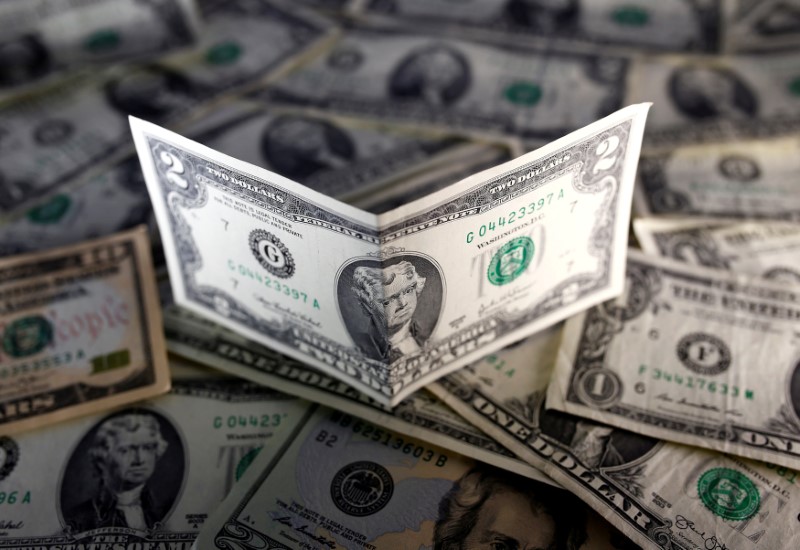By Rahul Karunakar
(Reuters) - The dollar will resume its upward climb in the coming year, but extreme near-term moves in either direction are possible, driven more by U.S. President Donald Trump's expected fiscal stimulus than by his words, a Reuters poll found.
After mostly gaining over the past three years, the dollar hit a wall in January, marking its biggest losses in three decades on concerns about the Trump administration's preference for a weak dollar and a radical policy on immigration.
In 2016, the dollar was down less than one percent until the U.S. election on Nov. 8. It then reversed course to end the year over 4 percent higher, something FX strategists polled by Reuters had not predicted before the vote.
Instead, they had said the dollar was likely to fall in the immediate aftermath if Trump were to win.
So far this year, concern over Trump's attitude to the dollar and global trade has pushed the currency down over 2 percent and pushed Treasury yields lower.
Speculators also cut bets in favor of the dollar for the fourth straight week. Net long positions fell to their lowest since last October, data from the Commodity Futures Trading Commission and calculations by Reuters showed.
Still, the latest poll of over 60 FX strategists, taken Feb 3-6, showed the bias was towards a stronger dollar over the coming year once the fog clears around the White House's tax and spending plans.
Six of the top 10 most accurate forecasters in Reuters polls last year are still forecasting broad dollar gains.
The dollar will also be aided from a divergence in monetary policy between the U.S. Federal Reserve, which is set to raise rates this year, and other major central banks, which are expected to keep rates low.
"The policy of the incoming U.S. administration, both actual and expected, are consistent with the U.S. dollar strength," said Erik Nelson at Wells Fargo (NYSE:WFC), the most accurate FX forecaster in Reuters polls on major currencies last year.
"Fiscal easing, whether that comes in the form of increased spending or reduced taxes, is going to represent a pretty stark shift from the more austere fiscal conditions we have seen over the past couple of years. So a mix of policies - both monetary and fiscal - surely are consistent with U.S. dollar gains."
Around 70 percent of the strategists, who answered an extra question, said Trump's policies would drive currency markets over the next two months.
Among those who chose Trump's policies, a slim majority said his protectionist policies could weigh on forex trades. The rest cited Trump's fiscal stimulus plan.
TRUMP TO TRUMP EURO ZONE POLITICS
Only a few strategists picked a potential upset in euro zone national elections as the big driver of currencies. But jitters before the coming French presidential election pushed the euro to a one-week low against a broadly weaker dollar on Monday.
The latest consensus is for the single currency, which is up around 2 percent this year, to weaken nearly 3 percent against the dollar to $1.04 in a year from $1.07 on Tuesday.
That median 12-month forecast matches January's which was the lowest since the February 2016 poll. Back then ,the Fed was widely expected to tighten further after taking rates higher in December 2015 for the first time in nearly a decade.
But those bearish views dissipated as expectations on the timing of Fed rate hikes see-sawed through the rest of the year.
Now, a bullish dollar view is driving strategists to once again predict euro weakness.
"It is all about the USD and about President Trump's policies," wrote Athanasios Vamvakidis, FX strategist at Bank of America Merrill Lynch (NYSE:BAC). "We continue to expect EUR/USD to weaken. Focusing on Europe, the elections in France and Germany, and potentially early elections in Italy, suggest substantial EUR risks."
However, the proportion of strategists calling for euro/dollar parity or lower is little changed compared with last month.
Sterling is also forecast to resume falling, having gained around 1.5 percent this year, once Britain begins talks on leaving the European Union. [GBP/POLL]
When asked which currency will gain from market uncertainty over the next three months, a majority of strategists chose the Japanese yen and the Swiss franc, both usually considered a safe bet when markets are in turmoil.
After around a 3 percent loss in 2016, the dollar fell against the yen to its lowest since late November on Tuesday, down about 4 percent so far this year. Yen short positions also declined to their lowest since early December.
Still, FX analysts are clinging to their favored bet - a weaker yen outlook, and the Japanese currency is now forecast to weaken about 7 percent to around 120.0 in a year from Tuesday.

(Reuters graphic summarising FX poll: http://tmsnrt.rs/2k8GCSM)
(Additional reporting and analysis by Anu Bararia and Sujith Pai; Polling by Khusboo Mittal and Vartika Sahu; Editing by Ross Finley/Jeremy Gaunt)